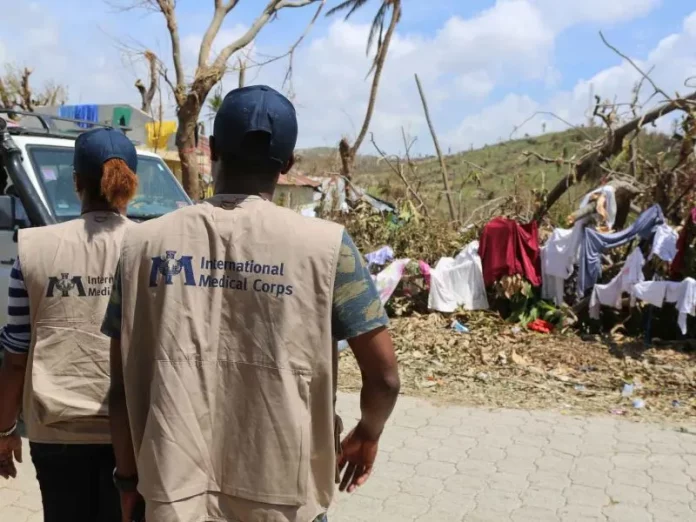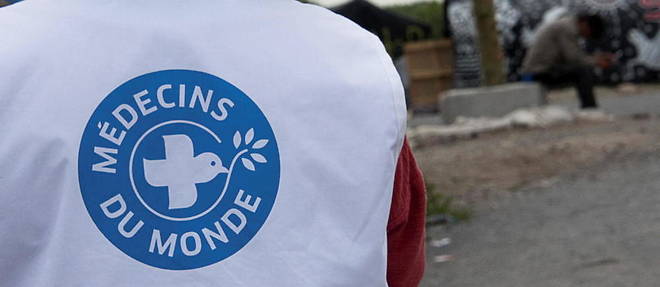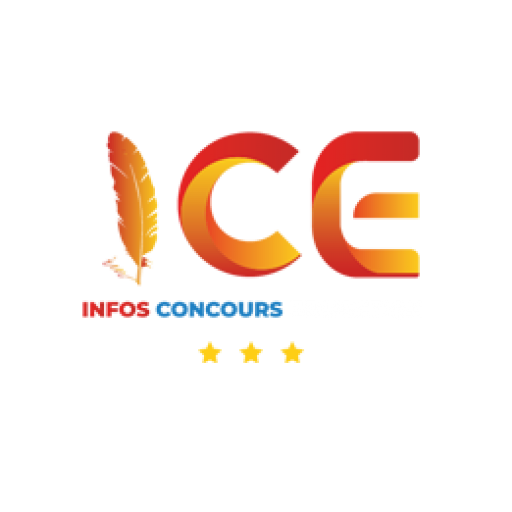International Medical Corps is looking for Coordinator, MEAL, Intl.
Location: Cameroon – CM (Primary)
Category: Monitoring & Evaluation (M&E)
Program Description (Background)
International Medical Corps has been providing emergency medical, nutritional as well protection assistance to refugees, IDPs and Vulnerable Host population in the Far North, North Adamaoua East, North and North West Regions.
IMC’s basic package of essential health care encompasses high impact primary health care services including disease surveillance, optimum transportation of biological samples, Water Sanitation and Hygiene as well as key nutrition, food security and protection interventions. Through support of existing Ministry of Health (MoH) health facilities, training of medical staff, and operation of mobile medical units (MMU), IMC offers curative and preventive consultations, maternal and child health (MCH) care, reproductive health services including skilled birth attendance, family planning (FP), syndromic management of sexually transmitted infections (STIs) and services of the Minimum Initial Services Package (MISP) for Reproductive Health (ie. clinical management of rape, HIV prevention, hygienic delivery, emergency obstetric and neonatal care (EmONC)), community-based surveillance of diseases of epidemic potential, support of biological samples transportation, therapeutic and supplementary nutrition services linked to comprehensive food security activities, gender-based violence (GBV) prevention and response, and mental health support. IMC also focuses on building the capacity of local community structures, such as village health committees (VHCs), community health workers (CHWs), and health centers management committees (COGEs).
CHWs are trained and supported to conduct health education and hygiene promotion activities in their communities to encourage healthy practices and utilization of available health services, and the capability of VHCs and COGES to supervise and manage health facility operations for the benefit of in their communities is enhanced. The aim of IMC’s work is to strengthen local social services and develop capacity for greater community resilience, while maintaining flexibility and the ability to respond to the continuing instability and accompanying increasing humanitarian needs in the country.
JOB SUMMARY:
The role of the Coordinator, Monitoring, Evaluation, Accountability, and Learning (MEAL) is to support better performance and greater accountability by implementing evidence-based program/project management at the field level, in order to guide and improve performance. The Coordinator, MEAL will provide the technical support to the design of methodologies and tools to ensure the availability of clear and accurate information at the program/project level. The Coordinator, MEAL also plays an important role in data management and quality by designing a MEAL system which adheres to the IMC’s Global MEAL Guidelines, the MEAL Minimum Standards for Quality, and the guiding MEAL policies and procedures. S/he will provide technical support to the program and build capacity in the country Mission through strengthening learning and knowledge sharing across the IMC and with the wider humanitarian community. The role holder will also support in project development including preparation and management of the MEAL budget, staffing plan and project design
To perform this job successfully, an individual must be able to perform each essential function with or without reasonable accommodation:
MAIN TASKS AND RESPONSIBILITIES
IMC’s policies, guidelines, and procedures
- Mainstream the Global MEAL Guidelines across all related MEAL activities at the field level and ensure the guidance notes for monitoring, evaluation, and accountability are functional at the field level.
- Map and detail the navigation, selection, application, and adaption of existing guidelines, tools, and templates at the relevant stages of the project cycle.
- Develop guidance and standards methodologies for the collection and analysis of data to allow for comparison and aggregation across time and the different projects.
- Actively promote Prevention of Sexual Exploitation and Abuse (PSEA) standards within IMC and amongst its beneficiaries.
- Contribute to the creation of a positive image and overall credibility of the organization, notably through the application of the Code of Conduct, ethics, values, and standpoint with regards to internal and external actors.
Project design and planning
-
- Design and coordinate needs assessment and situation analysis through various approaches (e.g. direct data collection, secondary sources, problem tree analysis, SWOT analysis) and ensure that needs assessment and project design are linked.
- Ensure MEAL requirements of the donors during proposal development, such as mandatory donors indicators and annexes, etc.
- Support to program and MEAL team with developing the results framework, theory of change, logframe Program Monitoring Tool (PMT), and MEAL plan including indicators for existing and new projects.
- Identify the budget/resources needed for MEAL activities of projects.
- Represent the organization in the MEAL and Assessment Working Groups promoting a positive image.
MEAL system
- In coordination with the Program Team and MEAL field Focal Points, establish a reliable participatory MEAL framework for the IMC Mission to ensure quality.
- Design full MEAL procedures and operating plans within the mission and develop harmonized data collection tools involving the different stakeholders (project team, partners)
- Ensure that accountability to affected populations (AAP) data is collected routinely throughout the project cycle, enabling evidence-based programming and corrective action.
- Develop data gathering strategies and reporting flows for projects in the mission.
- Oversee the collection and timely reporting of data and statistics from the health facilities and other centers.
- Consolidate statistics from Health, Nutrition, WASH, MHPSS, GBV and FLS (as applicable) sectors and analyzing cross-cutting indicators.
- Collaborate with the MEAL and DHIS2 teams at HQ to develop and maintain the data management system including updating, troubleshooting and promptly addressing all problems as they arise
- Implement DHIS2 where appropriate and applicable, control and manage DHIS2 data entry and management.
- Lead the implementation of Satellite-based Tracking and Remote Monitoring (STARM) system
- Lead the Quarterly Country Report process and work closely with program technical leads to aggregate project data at country level
- Conduct regular site visits or when required to monitor service provision and ensure data quality.
Data quality management
- Collaborate with technical staff in data quality maintenance, and routine monitoring of programs.
- Develop strategies for assessing the quality of collected data for the indicators and manage tools and methods for assessing data quality for all indicators.
- Organize the planning for project data quality audits and monitor and coordinate routine data quality audits conducted in different sites, compile results at the level of a project and develop actions plans to implement corrective measures.
- Coordinate data gathering and data management of population-based surveys and surveillance activities.
- Maintain data at the mission level according to IMC’s data protection protocols.
Sampling techniques
- Use proper sampling (probability and non-probability) techniques taking into account desired power, type of survey or evaluation (e.g. single point or multiple point; baseline vs endline), the objective of the survey or evaluation (e.g. testing for change or getting a point prevalence), and budget limitations.
- Ensure adherence to prescribed methodologies of sampling, data collection, and data entry.
- Facilitate, guide and supervise external consultant (if applicable) in conducting needs assessment, surveys, evaluations and contextual analysis. Review the methodology, sampling approach and other important details proposed by the expert/consultant.
- Lead the development of sampling frame, calculate the sample size and draw samples for surveys , including implementation of donor recommendations for the surveys..
Qualitative and quantitative techniques
- Develop and use different qualitative and quantitative methods of data collection including structured/ semi structured interviews, key informant interviews, in-depth interviews, group discussions, focus group discussions and direct observations as an M&E tool. Conduct trainings on quantitative and qualitative techniques for data collection for MEAL, program and interviewers.
- Prepare tabulation plan and perform quantitative data analysis
- Perform qualitative textual analysis, develop topical outlines (coding) and support the team in narrating the findings.
- Keeping the social dynamics, manage errors/bias and strategy to minimize them and to ensure the data collected is representative of populations without power (avoiding over dependence on community leaders, local authorities, and/or government authorities as primary sources for defining communities’ needs and preferences).
- Develop Terms of Reference (ToR) outlining the objectives, methodology, sampling approach and other necessary details for the study to be conducted internally or by a consultant and oversee the logistics of data collection and data management and ensure adequate resources are available.
- Design questionnaires for monitoring purposes and apply the different interview techniques (structured/semi-structured).
- Conduct regular site visits or when required to monitor and assist partners in the data collection process to ensure data quality.
Mobile and manual data collection
- Determine the appropriate data collection tool based on the purpose, advantages and disadvantages of mobile data collection techniques.
- Design simple and complex questionnaire using XLS or form builder (Kobo form builder, Ona form builder, etc.)
- Support in installing and configuring mobile data collection tools (OKD collect, Kobo collect, Ona collect, CommCare, etc.) on smart phones or tablets and manage data on mobile servers (Kobo form builder, Ona form builder, etc.)
- Increase capacity of other staff in developing XLS form and setting up mobile data collection.
Data analysis, including use of statistical software
- Develop guidance and standards methodologies for the collection and analysis of data to allow for comparison and aggregation across time and the different projects.
- Support MEAL and the project/program team on conducting statistical analysis including descriptive (univariate and bivariate data analysis) and inferential analysis using statistical software.
- Support the qualitative analysis, and develop topical outlines (coding).
- Develop spatial data from maps, documents, and other data sources.
- Analyze data and develop spatial data models and maps.
- Triangulate findings from several qualitative and quantitative sources.
- Interpret statistical data for use in decision-making and synthesize quantitative and qualitative information for write-up/reports and decision making.
Evaluation design
- Develop TOR for internal and external baseline surveys, mid-term evaluations, final evaluations and frame the different types of study questions such as barrier analysis, market analysis, Knowledge, Attitudes, and Practices Surveys (KAP).
- Make a comprehensive situation analysis to inform an evaluation.
- Identify the needed resources for evaluation, such as information, expertise, personnel, instruments, and budget.
- Manage the administrative and logistic process of evaluations involving external evaluators.
- Train and supervise data gathering of internal performance evaluation and design and synthesize the findings from participative evaluation techniques (actively involving affected communities in the evaluation exercises).
Presenting information
- Write full narrative reports (needs assessments, internal reviews, progress reports) and executive summaries.
- Present information and ‘tell the story’ of the project to multiple audiences and decision makers based on the findings from the analysis and monitoring.
- Verify reports’ accuracy and presentation of information, including the use of appropriate graphs and tables.
- Disseminate qualitative and quantitative results using the established dashboard or system as per agreed frequency.
- Presents AAP data in simplified yet informative formats, depicting disaggregated community perceptions on quality of humanitarian actions and accountability commitments.
- Report and share evaluation finding to stakeholders.
Management and leadership
- Support the Country Office in identifying the human resources needs in MEAL department and support in recruitment, onboarding and training.
- Provide technical supervision and coordination of MEAL Officers from field sites.
- Create and sustain a work environment of mutual respect where team members strive to achieve excellence.
Capacity development and training
- Identify the gaps in staff knowledge of MEAL concepts and skills and provide trainings in these topics.
- Provide coaching/mentoring of staff and on-the-job training to improve the skills of the staff in MEAL.
- Deliver intermediate-level training to the MEAL team and conduct training on qualitative techniques for data collection for interviewers.
- Support program staff with additional training and mentoring on routine monitoring procedures and surveillance techniques.
- Organize annual refreshment training on Accountability/CBFRM for staff and volunteers
Knowledge management and learning
- Develop KML mechanisms and processes for the mission while ensuring these mechanisms are in line with IMC’s guidelines
- Establish basic learning systems that incorporate program studies’ findings, lessons learned, achievements and gaps, and develop all the tools required to support learning practices.
- Organize internal reviews and lessons learned workshops and present practical recommendations
- Ensure after-action reviews and lessons learned exercises, including data collected through Community-Based Feedback and Response Mechanism (CBFRM) and other participative forms of community engagement and feedback collection.
Community based feedback and response mechanism
- Provide technical support to the team on establishing and maintaining effective feedback mechanisms for decision making, fully in line with commitments regarding accountability to affected populations (AAP), including IASC CAAP, CHS, and Sphere Humanitarian Charter
- Implement and monitor the CBFRM, accountability initiatives, and practices across the mission.
- Lead the implementation of methodologies to consult communities on their preferences based on the operational context.
Cross-cutting themes
- Support IMC program staff and management to mainstream critical concepts around gender, age, disability protection, and conflict sensitivity across all projects and programs by:
- Supporting dedicated gender, protection, and conflict sensitivity analyses as may be required by programs.
- Integrating the collection of information related to demographic vulnerabilities and contextual risks (gender, age, disability, etc.) into all MEAL exercises to provide an evidence base.
- Following up with program teams to utilize findings and strengthen activities in line with gender, protection, and conflict-sensitive approaches
Perform other duties as assigned. The duties and responsibilities listed in this document are representative of the nature and level of work assigned and not necessarily all inclusive.
MINIMUM QUALIFICATIONS
- Typically, a Bachelor’s degree in social sciences, public health, statistics, or international development, with experience or background in MEAL, epidemiology, public health, and health information management. Master’s degree preferred. Equivalent combination of relevant education and experience may be substituted as appropriate.
- Typically, 8+ years of relevant and progressive experience working in related field, including minimum of 5 years of applied experience with a humanitarian organization in designing, implementing and overseeing monitoring and evaluation tasks in relevant sectors.
- Demonstrated experience in managing teams and building staff capacity within complex programming.
- Experience with MEAL approaches for key donors such as USAID, BHA, OFDA, ECHO, EU, DfID, UN, etc.
- Experience in database design and other tools for information management like DHIS2;
- Experience in use of qualitative and quantitative software for data analysis.
- Experience with mobile data collection platform
- Able to identify gaps in staff knowledge of MEAL concepts and skills and provide training in these topics.
- Know causal analysis approaches (e.g. problem tree analysis, SWOT analysis) and carry out situation analysis and assessment of needs and opportunities (with the inputs of technical specialists).
- Possess the skills to write full narrative reports (needs assessments, internal reviews, progress reports) and executive summaries.
- Demonstrated understanding of data protection and confidentiality as part of data collection and management practices, and ability to respect and maintain confidentiality.
- Proficiency in Microsoft Office applications, including Word, Excel, Outlook, PowerPoint and Teams.
- Competency in using statistical software EPI-Info, SPSS, and STATA.
- Possess the skills in qualitative data analysis software such as MaxQDA, NVivo, Atlas.ti.
- Possess the skills in mobile data collection software such as Ona, KoboToolBox.
- Perform inferential analysis using statistical software.
- Knowledge of inferential statistics.
Additional Technical or Language Requirements
- Master’s-level or a higher degree in social sciences, public health, statistics, or international development, with experience or background in M&E, epidemiology, public health, and health information management.
- Minimum of 5 years of applied experience with a humanitarian organization in designing, implementing, and overseeing monitoring and evaluation tasks.
- Demonstrated experience in managing teams and building staff capacity within complex programing.
- Experience with M&E approaches for key donors such as OFDA, ECHO, EU, DfID, UN etc.
- Able to identify gaps in staff knowledge of MEAL concepts and skills and provide a training in these topics.
- Know causal analysis approaches (e.g. problem tree analysis, SWOT analysis) and carry out situation analysis and assessment of needs and opportunities (with the inputs of technical specialists).
- Possess the skills to write full narrative reports (needs assessments, internal reviews, progress reports) and executive summaries.
- Demonstrated understanding of data protection and confidentiality as part of data collection and management practices, and ability to respect and maintain confidentiality.
- Proficiency in Microsoft Office applications, including Word, Excel, Outlook, and PowerPoint.
- High-level MISSION’S French and English proficiency (Speaking – Reading – Writing).
HOW TO APPLY?
N.B: Ne payez aucun frais pour obtenir un emploi
Notre chaine youtube: Infosconcourseducation





